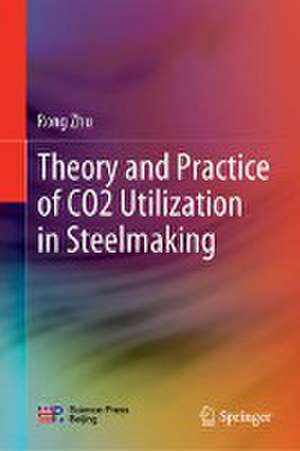Theory and Practice of CO2 Utilization in Steelmaking
Autor Rong Zhuen Limba Engleză Hardback – 12 sep 2022
This book is used as a reference book for managers, engineering and technical personnel, and related professional teachers and students of Iron & Steel enterprises, government departments, consulting services and evaluation agencies, colleges, and secondary professional schools.
| Toate formatele și edițiile | Preț | Express |
|---|---|---|
| Paperback (1) | 810.53 lei 38-44 zile | |
| Springer Nature Singapore – 13 sep 2023 | 810.53 lei 38-44 zile | |
| Hardback (1) | 959.98 lei 3-5 săpt. | |
| Springer Nature Singapore – 12 sep 2022 | 959.98 lei 3-5 săpt. |
Preț: 959.98 lei
Preț vechi: 1170.71 lei
-18% Nou
Puncte Express: 1440
Preț estimativ în valută:
183.72€ • 191.09$ • 151.67£
183.72€ • 191.09$ • 151.67£
Carte disponibilă
Livrare economică 24 martie-07 aprilie
Preluare comenzi: 021 569.72.76
Specificații
ISBN-13: 9789811925443
ISBN-10: 9811925445
Pagini: 444
Ilustrații: XIII, 444 p. 317 illus., 13 illus. in color.
Dimensiuni: 155 x 235 mm
Greutate: 0.86 kg
Ediția:1st ed. 2023
Editura: Springer Nature Singapore
Colecția Springer
Locul publicării:Singapore, Singapore
ISBN-10: 9811925445
Pagini: 444
Ilustrații: XIII, 444 p. 317 illus., 13 illus. in color.
Dimensiuni: 155 x 235 mm
Greutate: 0.86 kg
Ediția:1st ed. 2023
Editura: Springer Nature Singapore
Colecția Springer
Locul publicării:Singapore, Singapore
Cuprins
Preface.- Introduction.- The thermodynamics of CO2 in the steelmaking process.- The kinetics of using CO2 in steelmaking.- Materials and heat balance of the CO2 used in steelmaking.- Basic Theory of CO2 use in Refining.- The Theory of Limestone Decomposing CO2 Steelmaking.- Decarburization and chromium (Cr) yield of a chromium-containing melt by CO2.- Application of CO2 injection in the steelmaking process.- References.
Notă biografică
Dr. Rong Zhu is currently a professor in University of Science and Technology Beijing. He is the winner of the first national innovation prize, the national advanced worker in science and technology, the winner of Beijing Teachers' morality model (Pioneer), the winner of Baosteel excellent teacher award, and the expert enjoying the special allowance of the State Council. He was selected as one of the first batches of “National University Huang Danian style teacher team”, the director of Beijing Key Laboratory of high end metal smelting and preparation, and the director of Beijing Key Laboratory of high end metal smelting and preparation. He is the director of the Reserach Center of Carbon Dioxide Science in Beijing University of Science and Technology, the member of expert committee of China Society of metals, the director of electrometallurgy branch, the deputy director of special steel branch, the member of steelmaking branch, the member of China Electrotechnical Society, and the member of National Professional Standardization Technical Committee. He has been engaged in the research of steelmaking technology and engineering application for a long time and is one of the main academic leaders in this field. He has presided over/participated in a number of national “973” major basic projects, national science and technology support plan, national natural science key and general funds, provincial and municipal key projects, won 3 second prizes of national science and technology progress (2 first prizes), 6 first prizes of provincial and ministerial level, published 5 monographs, authorized more than 100 invention patents, and published more than 200 papers. The related technology has been extended to more than 200 iron and steel enterprises at home and abroad.
Textul de pe ultima copertă
This book analyzes the mechanism of the application of CO2 in steelmaking, by looking at the thermodynamics and kinetics of the reactions of CO2 with the elements present in molten steel. This book is the first academic monograph either at home or abroad on the application of CO2 in the steelmaking field. The thermodynamic conditions of the reactions of CO2 with silicon, manganese, phosphorus, chromium, nickel, vanadium, and other elements were calculated and analyzed using the FactSage thermodynamic software, and the selective oxidation law of the above multiple elements by CO2 was also analyzed. In terms of kinetics, the interfacial reaction mechanism of CO2 was analyzed via gas isotope exchange technology, and the O2 transfer process and transfer rate between the CO2, slag, and steel were studied. In terms of materials and energy balance, how to use the high-temperature characteristics of CO2 to control the temperature of the molten pool, improve the reaction conditions of molten iron, reduce the evaporation of molten iron, and reduce the amount of steelmaking dust were introduced. Based on the experimental data, theoretical models of unit operation for the application of CO2 in steelmaking were established, including decarburization, denitrification, dephosphorization, decarburization and chromium retention, vanadium extraction, and carbon preservation, and these theoretical models were applied to the steelmaking production process, which is an important step in going from theory to practice. The above research work has opened up a new solution for energy saving and liquid steel cleaning in the iron and steel production process and represents progress in steelmaking technology.
This book is used as a reference book for managers, engineering and technical personnel, and related professional teachers and students of Iron & Steel enterprises, government departments, consulting services and evaluation agencies, colleges, and secondary professional schools.
This book is used as a reference book for managers, engineering and technical personnel, and related professional teachers and students of Iron & Steel enterprises, government departments, consulting services and evaluation agencies, colleges, and secondary professional schools.
Caracteristici
Is the first professional book on CO2 utilization in steelmaking
Provides practical reference materials for global Iron & Steel companies to create green metallurgical technologies
Casts new light on the development of low-carbon metallurgy
Provides practical reference materials for global Iron & Steel companies to create green metallurgical technologies
Casts new light on the development of low-carbon metallurgy
